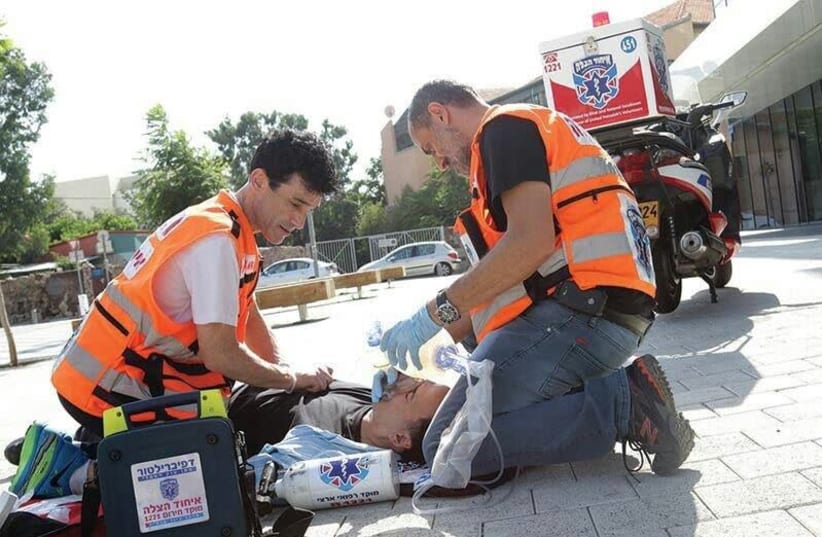Only one-in-10 Israelis knows how to administer cardiopulmonary resuscitation (CRP) when someone collapses from cardiac arrest. CPR, which can be learned in first-aid courses, combines chest compressions with or without artificial ventilation in an effort to manually preserve intact brain function and restore spontaneous blood circulation and breathing.
According to new study carried out by the Smith Institute, only 10% of the Israeli population knows how to administer CPR effectively in an emergency situation. The study was undertaken at the initiative of United Hatzalah (UH) ahead of World First Aid Day, which was held on Saturday, September 9, but was be observed in Israel on Sunday,. Rafi Smith and Olga Pni’el from the Smith Research Institute.Another worrisome fact that came out of the study was that many Israelis believe that they know how to perform CPR effectively on a person who collapses, when in reality, the CPR they would administer would not be effective, and possibly even have harmful side effects. According to the study, almost one-third of those queried believe that they knew how to perform effective CPR, while another 70% admitted that they didn’t know to perform effective CPR or CPR at all.
Two-thirds said they learned how to perform CPR under one program or another, many of whom were last trained in first aid (usually in a one-hour lesson) during their IDF service, while only 31% percent said that they never learned how to perform CPR. More than half of those who responded (58%) said that they wouldn’t attempt to do CPR on a person who collapsed in their vicinity and would instead try to find someone else who knew how to perform CPR properly.
When taking personal history into account, only 24% of the people asked who had come across a medical emergency that required CPR actually tried to perform CPR, whereas 29% responded and said they simply froze and were unable to do anything.
The study was aimed at discovering how well the general populace of Israel could respond to a medical emergency that they came across before emergency responders could arrive. The Smith Institute conducted it on the 22nd and 23rd of August on 700 Israeli adults filling out a questionnaire and represented a cross section of the general populace of the country above the age of 18 years old. The margin of error in the study is estimated at 3.7%.
UH president and founder Eli Beer said, “The success of first aid very much depends on how fast treatment can begin. This means that it is of vital importance for family members and passersby to begin first aid and CPR even before emergency services can arrive. We at United Hatzalah place incredible importance upon empowering and educating the community with regards to beginning CPR and providing first aid treatment even before our volunteers can arrive.”
Beer added that “it is for this reason that over the past number of years we have dedicated a large part of our resources to the Family First project, which teaches people from the general public how to properly administer basic CPR as well as other first aid procedures. In commemorating World First Aid Day, we call upon the public to sign up for the courses, which are offered all across the country in a flexible four-hour session, and to take it upon themselves to know how to respond to a medical emergency should it arise in your vicinity. The people you will save will likely be your own family members, friends, co-workers and others closest to you.”
Asked to comment, Health Ministry spokesman Eyal Basson said it “sees great importance in providing initial response to medical emergencies by the public even before the arrival of the rescue forces...This is also reflected in the law that states that every 10th grader must take a 10-hour first-aid course.”
The spokesman also noted that every IDF soldier takes a first-aid course, but he did not relate to the fact that it is only one-hour long and not repeated during nearly three years of mandatory military service.
“In view of the recognition of importance, the subject was also included in the program within the framework of the National Quality Indicators program in the health system. Accordingly, the ministry is examining the scope of the telephone training provided by the emergency staff in various organizations and companies that operate (MDA and private ambulance companies) to perform CPR.”
The Jerusalem Post asked the ministry would undertake a nationwide campaign, such as that held in Oregon decades ago that taught almost every adult CPR and dramatically reduced the death rate from cardiac arrest, or to provide detailed CPR lessons via the Internet. Basson would only say the ministry intends to “launch a campaign for the general public in the coming months to identify emergency situations and increase the ability to perform resuscitation in various settings and to train the general public to perform resuscitation as an example.”
The Post learned however that the budget allocated for such a campaign, whose details were not disclosed, was only NIS 500,000, which would not allow major public exposure. Several years ago, the Post supplied the ministry with an Internet program that a US university was willing to supply the ministry at no cost to teach CPR in detail that had only to be translated into English. The then-deputy director-general for information, Yair Amikam , declined to have the program translated and did not run any other information campaign on the subject.
Since Amikam retired almost two years ago, the current deputy director-general for information, Einav Shimron Greenbaum is only now considering a low-budget campaign, but no details were provided.
